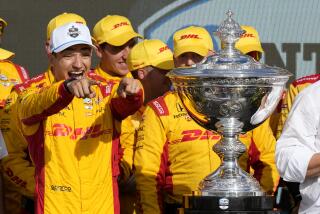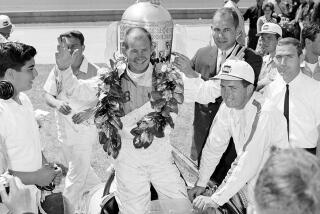Out of nowhere comes a race car win for the ages
- Share via
Beverly Hills is such a dump.
Why does anybody live here? I can’t find a decent sports bar, or even a 7-Eleven where I can feed my out-of-town guests. Yep, B-Hills is definitely a dump. Don’t see it lasting more than a few thousand more years, max.
Yet I stop by because I don’t give up on people, places or things — no matter how hyper-gentrified and super-successful they are.
Take Alexander Rossi, for instance.
In true Beverly Hills fashion, one day he’s nobody, the next day he’s king.
In May, my lunch mate coasted across the finish line of the Indianapolis 500 out of gas, the engine dead, holding his breath after running out of juice with a half-mile to go. The California kid’s improbable victory is, in this Year of the Underdog, the most-audacious individual performance to date.
I mean, who wins the Indy 500 on fumes? Rossi does, apparently.
“The engine was off at Turn 4,” he says. “We were out. That was it.”
The Cinderella story, out of nowhere.
Well, Rossi isn’t exactly out of nowhere, but you could see it from there. Grew up in Gold Country, an hour from Sacramento, just west of nowhere. Nevada City has 3,000 people and 6 billion trees.
When he was 4, his dad, Peter, took him to the races at Laguna Seca. They struck something shiny. By 14, he was a prodigy, the youngest winner of the Skip Barber National Championship.
By the time Rossi was 17, his father, a landscape architect, set up a corporation of investors to finance his son’s dream of racing Formula 1 cars, the land yachts of motor sports — generally a $12-million shared commitment.
That worked: Formula 1 had a promising new American star.
Yet opportunities proved elusive, and he was relegated to a reserve driver role, the equivalent of being benched. Race car culture overseas was different too. In America, drivers worked with each other to improve performance and even socialized together. In Europe, such camaraderie was rare to non-existent.
When Michael Andretti called in February, with a spot in an Indy car, the outgoing American came home.
No similarities. Zero. It’s a race car on a track, that’s it.
— Alexander Rossi on jumping from F1 to Indy cars
Never mind that, as a Formula 1 driver used to looping through blocked-off city streets, he lacked experience on an oval racetrack. Never mind that he was sitting down to a whole new experience.
“No similarities,” he says of F1 and Indy cars. “Zero. It’s a race car on a track, that’s it.”
Different gearboxes, different everything.
Climb into one of these Indy rockets, and good luck. Cramped quarters. Not even cup holders (a tube system delivers water). You clutch to get out of the pits — the only time you clutch. You have six gears, with 4 and 5 your favorites.
With no clutch, you can paddle-shift down at full throttle, 220 mph. If you did that with a Formula 1 machine, you’d DOA the engine, then they’d deport you. Don’t let the car door hit you in the back, pal.
Step One of Rossi’s Indy makeover: Muscle memory had to go out the door.
He credits teamwork and transparency for making a quick and successful transition. It wasn’t till a month before Indy that he would race on an oval course.
“The way we worked as a team, there were no secrets,” he says of training with Andretti and Bryan Herta. “We’d sit around a round table for an hour and a half every day and discuss what’s right, what’s wrong.”
Still, at Indy that steamy May day, things went way wrong. During pit stops, the crew struggled to get the fuel probe into the tank. The first stop, they lost three spots. The second, 12. By the third, they were 20 cars back.
“Now, we’re last. We have to do something,” Rossi recalled.
So he and Herta decided to skip the last pit stop. Normally, an Indy car can go 31 laps (77.5 miles) on a tank of fuel. To have any chance of winning, they needed to stretch that to 36.
To sip what was left, Rossi pounded the car through turns, then eased off when he could, eventually running out of gas on the last turn and coasting to win motor sports’ biggest prize.
“People say you win Indy because everything goes right,” he says. “But we won because everything went wrong. There’s people to this day who don’t believe we made five extra laps without fuel.”
Like Beverly Hills, fuel is often overrated. Who needs it really? Especially when you have chutzpah on your side.
Twitter: @erskinetimes
MORE SPORTS NEWS
Patriots quarterback Tom Brady’s ‘Deflategate’ appeal rejected by federal court
Rams to inform fans they’ve sold out season tickets, will begin selling single-game tickets
Manny Pacquiao tells promoter Bob Arum he’s willing to un-retire for a fall bout
More to Read
Go beyond the scoreboard
Get the latest on L.A.'s teams in the daily Sports Report newsletter.
You may occasionally receive promotional content from the Los Angeles Times.











